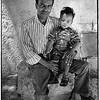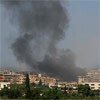
It's not just the occupation
7 June 2007
“Forty years ago today was the last day the citizens of Israel were a free people in their own land,” wrote Ha’aretz columnist Akiva Eldar on June 4. “It was the last day we lived here without living other peoples’ lives.” This sums up the cherished mythology of what is still called the Israeli left and much of the international peace process industry — that prior to the 1967 war, Israel was pure and on the right path. EI’s Ali Abunimah challenges the idea that had Israel not “become an occupier” the region would have had a happier history. Read more about It's not just the occupation








